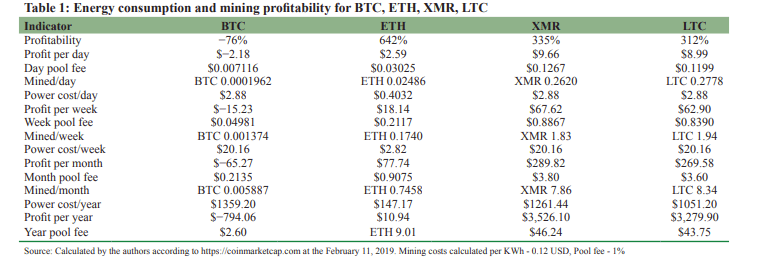As the world shifts towards more Eco-friendly technologies in an effort to halt the effects of global warming, a new development in the IT field might take us a few steps backwards.
Blockchain’s Environmental Cost
You’ve probably heard fantastic tales about Blockchain, the decentralized and encrypted marvel that promises to rescue us from prying government eyes and overreaching corporations like Google and Facebook. However, what might have escaped your attention is the energy inefficiency inherent in this peer-to-peer method of ledger and record keeping.
The increased popularity of Blockchain, fueled by phenomena like cryptocurrencies and NFTs, is raising the power consumption all around the globe as everyone scrambles to find ways to make profit from this trending technology. Take China, for instance:
In 2018, the popular cryptocurrency Monero accounted for 30.34GWh of China’s total power consumption, contributing to carbon emissions ranging between 19.12 and 19.42 thousand tons from April to December. – Elsevier
And that’s just in China.
For comparison, a regular household uses up to 722KWh of energy a year in China.
The cryptocurrency Economics
For the visual learners here is a table that shows the average consumption and profitability of cryptocurrencies in 2019 according to a ZBW published research paper:

Source: Blockchain infrastructure and growth of global power consumption
The table clearly shows that some Cryptocurrencies are barely profitable if not a loss of money because of their high power consumption.
Energy Costs of NFT transactions
These big numbers are only getting bigger as Blockchain grows in popularity around the world but it’s not just the mining that is a danger to the planet.
NFTs or Non Fungible Tokens that serve as a quasi proof of ownership of digital art are a trend that is gaining traction in 2021 as some NFTs such Cryptopunk#9998 has sold for over 500 Million Dollars. Yes, that’s a 5 followed by 8 zeroes.
And can you guess how much energy this transaction and transfer of ownership on the blockchain can consume? About 8.7MWh for a single update of this proof of ownership, that is still more than the 722KWh that can sustain an average household for a whole year.
For more comparisons, Paper, a primitive way to prove one’s ownership of an artwork consumes 2.9MWh to produce a whole a ton. That’s 2.9MWh for 200 000 sheets of A4 paper.
Beyond the Hype: NFTs and Copyright
That and the fact that owning an NFT token doesn’t grant legal copyright protection, as anyone on the internet can easily take a screenshot or save the artwork you’ve purchased for millions. This is whatishas turned the technology into somewhat of a meme. People have taken to right-clicking images of NFT art, both to criticize and mock the NFT market. It’s important to note that, despite this, capturing a screenshot or saving an NFT to your device remains entirely legal.
Working on Sustainable Solutions
However, the narrative around Blockchain and NFTs isn’t entirely negative. The technology has already demonstrated its value as a means to counter intrusive corporations and governments, offering a decentralized method of record-keeping. Even those who champion and defend the technology acknowledge its inefficiencies and are actively working on solutions.
John Crain, CEO of a leading NFT marketplace, is actively raising awareness about the environmental impact of NFT transactions. He has taken a proactive step by attaching an energy consumption figure for each artwork sold through his company, emphasizing the urgency for more sustainable solutions.
In addition to that, The Ethereum foundation even introduced Ethereum 2.0 known as “Serenity” aiming to increase efficiency and reduce energy waste caused by blockchain transactions.
Conclusion
All in all Blockchain is not the perfect technology that the media has made it to be BUT it’s not all bad as the demand for it and its popularity have proven.
With some refinements and a heightened environmental awareness, Blockchain could seamlessly integrate into more mainstream applications. Maybe one day, decentralized cryptocurrencies can replace the world’s centralized banking and economic systems as the cryptoentheusiasts hope.
What are your thoughts about Cryptocurrencies, NFTs and Blockchain in general and what do you think the future holds for this world changing technology ?
By Yacine Ben Ahmed
Elevate your brand with Orenda Junior Enterprise! Our dynamic team specializes in web development, graphic design, and video editing. Collaborate with us to create or improve your online success.
Contact us here today or call us : (+216) 53 980 906 / (+216) ) 52 028 567
